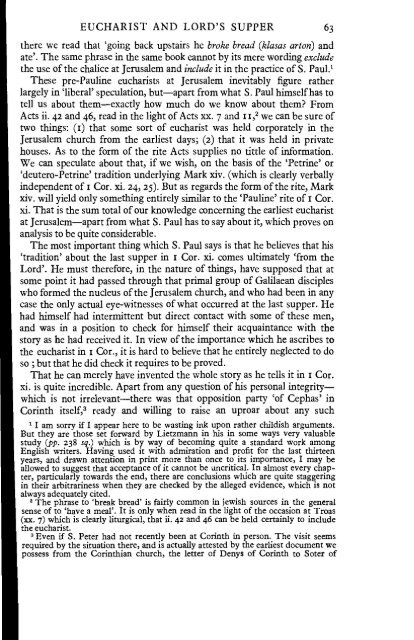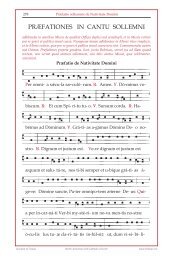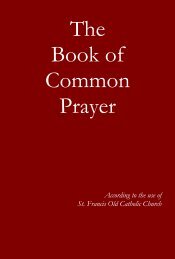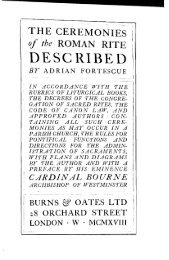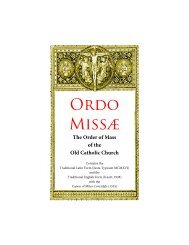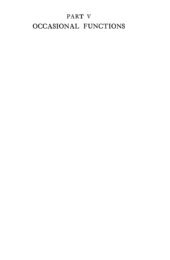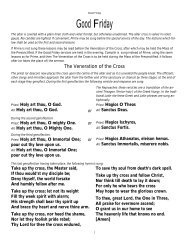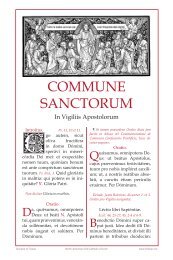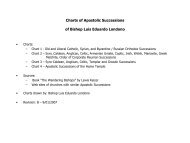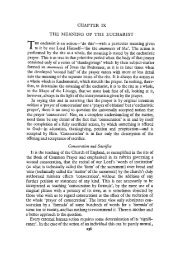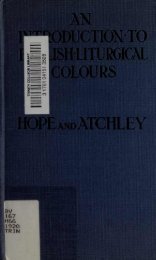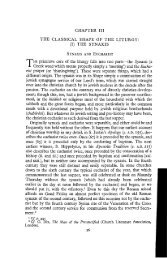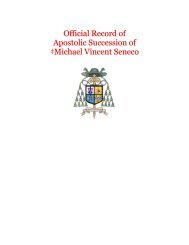Eucharist and Lord's Supper
Eucharist and Lord's Supper
Eucharist and Lord's Supper
Create successful ePaper yourself
Turn your PDF publications into a flip-book with our unique Google optimized e-Paper software.
EUCHARIST AND LORD'S SUPPER<br />
there we read that 'going back upstairs he broke bread (klasas arton) <strong>and</strong><br />
ate'. The same phrase in the same book cannot by its mere wording exclude<br />
the use of the chalice at Jerusalem <strong>and</strong> include it in the practice of S. Paul,1<br />
These pre-Pauline eucharists at Jerusalem inevitably figure rather<br />
largely in 'liberal' speculation, but-apart from what S. Paul himself has to<br />
tell us about them-exactly how much do we know about them? From<br />
Acts ii. 42 <strong>and</strong> 46, read in the light of Acts xx. 7 <strong>and</strong> II,2 we can be sure of<br />
two things: (I) that some sort of eucharist was held corporately in the<br />
Jerusalem church from the earliest days; (2) that it was held in private<br />
houses. As to the form of the rite Acts supplies no tittle of information.<br />
We can speculate about that, if we wish, on the basis of the 'Petrine' or<br />
'deutero-Petrine' tradition underlying Mark xiv. (which is clearly verbally<br />
independent of 1 Cor. xi. 24, 25). But as regards the form of the rite, Mark<br />
xiv. will yield only something entirely similar to the 'Pauline' rite of 1 Cor.<br />
xi. That is the sum total of our knowledge concerning the earliest eucharist<br />
at Jerusalem-apart from what S. Paul has to say about it, which proves on<br />
analysisto be quite considerable.<br />
The most important thing which S. Paul says is that he believes that his<br />
'tradition' about the last supper in 1 Cor. xi. comes ultimately 'from the<br />
Lord'. He must therefore, in the nature of things, have supposed that at<br />
some point it had passed through that primal group of Galilaean disciples<br />
who formed the nucleus of the Jerusalem church, <strong>and</strong> who had been in any<br />
case the only actual eye-witnesses of what occurred at the last supper. He<br />
had himself had intermittent but direct contact with some of these men)<br />
<strong>and</strong> was in a position to check for himself their acquaintance with the<br />
story as he had received it. In view of the importance which he ascribes to<br />
the eucharist in 1 Cor., it is hard to believe that he entirely neglected to do<br />
so ; but that he did checkit requires to be proved.<br />
That he can merely have invented the whole story as he tells it in I Cor.<br />
xi. is quite incredible. Apart from any question of his personal integritywhich<br />
is not irrelevant-there was that opposition party 'of Cephas' in<br />
Corinth itself, 3 ready <strong>and</strong> willing to raise an uproar about any such<br />
1 I am sorry if I appear here to be wasting ink upon rather childish arguments.<br />
But they are those set forward by Lietzmann in his in some ways very valuable<br />
study (pp. 238 sq.) which is by way of becoming quite a st<strong>and</strong>ard work among<br />
English writers. Having used it with admiration <strong>and</strong> profit for the last thirteen<br />
years, <strong>and</strong> drawn attention in print more than once to its importance, I may be<br />
allowed to suggest that acceptance of it cannot be uncritical. In almost every chapter,<br />
particularly towards the end, there are conclusions which are quite staggering<br />
in their arbitrariness when they are checked by the alleged evidence, which is not<br />
always adequately cited.<br />
2 The phrase to 'break bread' is fairly common in jewish sources in the general<br />
sense of to 'have a meal'. It is only when read in the light of the occasion at Troas<br />
(xx. 7) which is clearly liturgical, that ii. 42 <strong>and</strong> 46 can be held certainly to include<br />
the eucharist.<br />
3 Even if S. Peter had not recently been at Corinth in person. The visit seems<br />
required by the situation there, <strong>and</strong> is actually attested by the earliest document we<br />
possess from the Corinthian church, the letter of Denys of Corinth to Soter of


